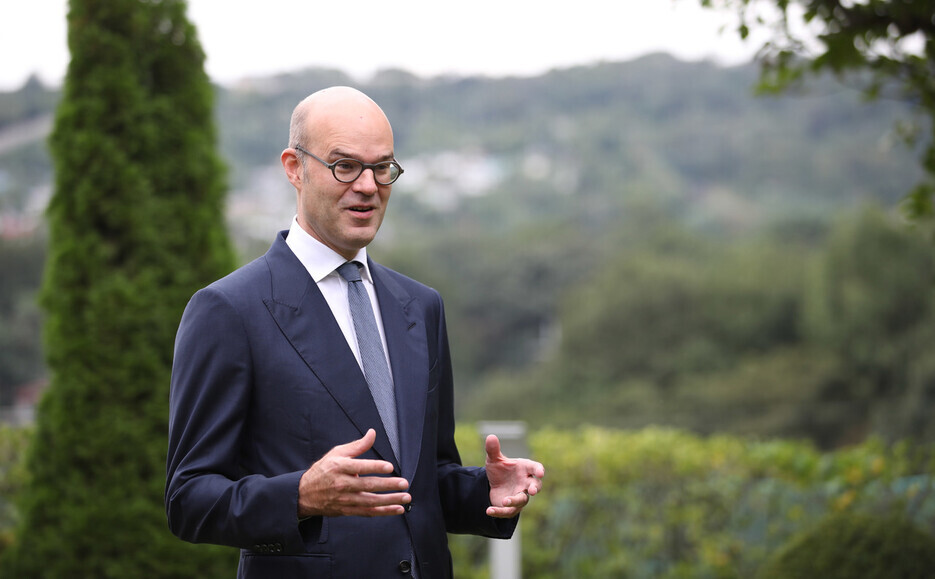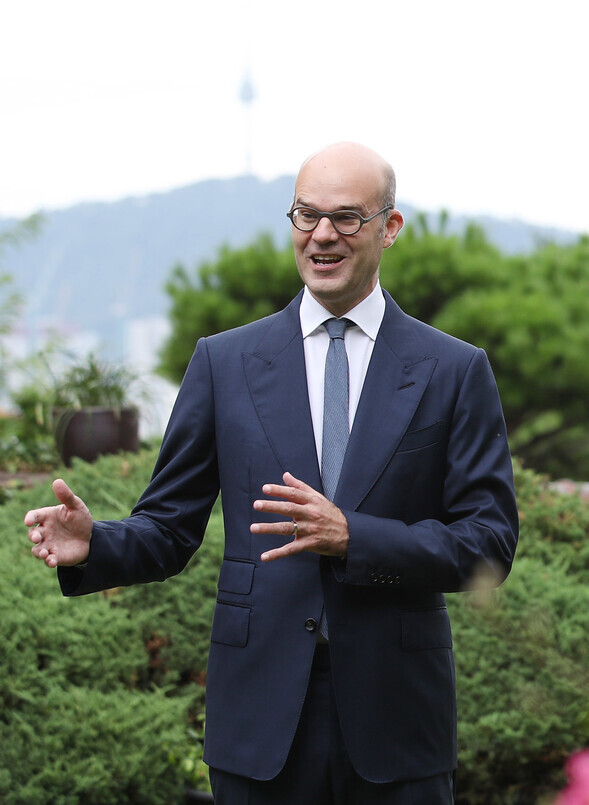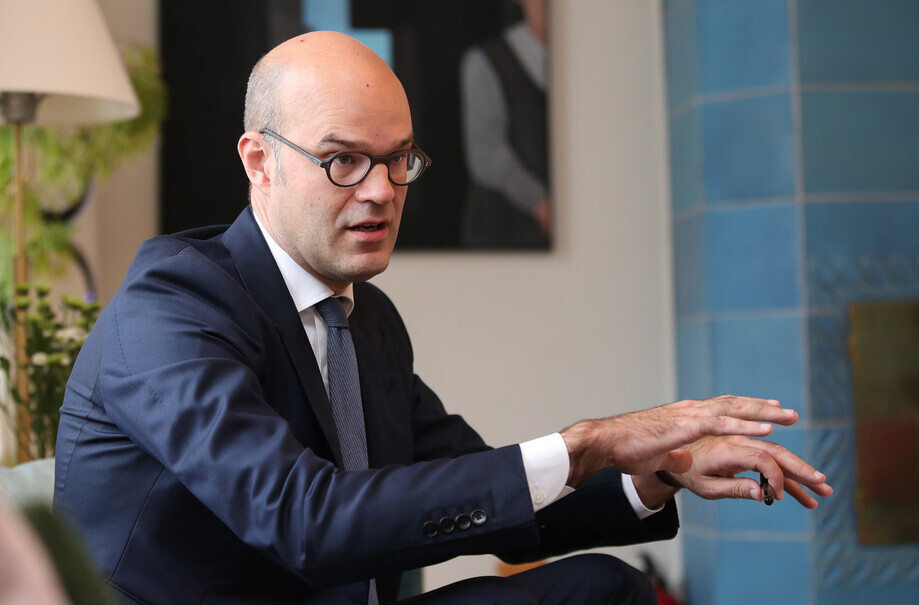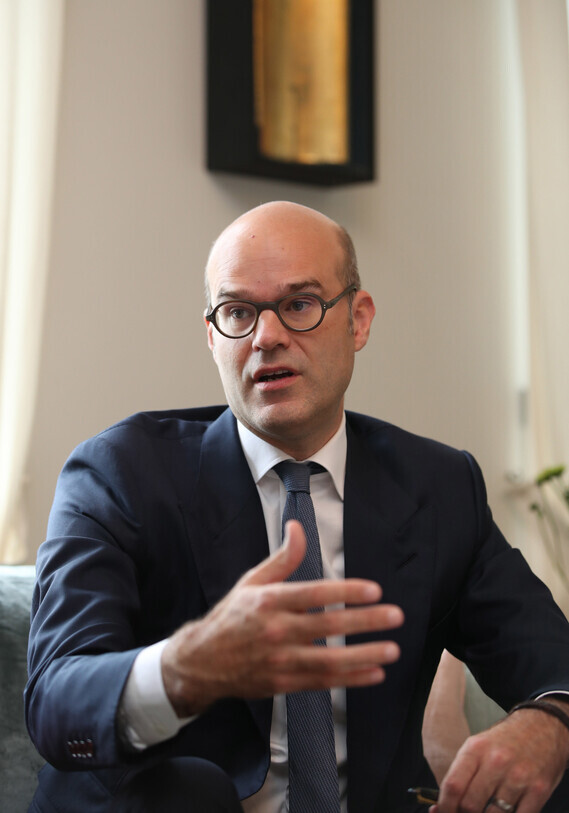hankyoreh
Links to other country sites 다른 나라 사이트 링크
Sweden’s NATO membership will have “deterrent effect” for Northern Europe, says ambassador

Sweden’s decision in May to join NATO was based on broad support from the general public and politicians of various affiliations. It was actively backed not just by the left-wing coalition centering on the Social Democratic Party ― which was in power at the time ― but also by the right-wing coalition that emerged victorious in the general election on Sept. 11.
With this decision, Sweden abandoned its status as a neutral country that it had retained for around two centuries. How do the Swedes view the European security crisis that started with Russia’s invasion of Ukraine?
On Sept. 14, the Hankyoreh sat down with Daniel Wolvén, the Swedish ambassador to the Republic of Korea.

Wolvén: Sweden used to be a neutral country. When we joined the European Union in 1995, we became a militarily non-aligned country. According to the Treaty of the European Union (Article 42.7), European countries are bound to come to each other’s assistance [if victimized by armed aggression]. The change in Sweden’s security policy was prompted by Russia’s extensive aggression against Ukraine and the fundamental change it brought to the entire security of Europe. Already by March 16 of this year, the Swedish government had set up a working group to consider the question of what Russia’s invasion of Ukraine and the change in security environment would mean for Sweden. And the conclusion of that work is what we see now, namely, a Swedish application for NATO membership. Given the new situation, we concluded that Swedish NATO membership would raise the threshold for military conflicts and have a deterrent effect for all of Northern Europe. The government had broad support in the Swedish parliament to apply for membership in NATO.
Hani: It was a very quick decision following the outbreak of war.Wolvén: There’s clearly been discussion over the years on NATO membership in Sweden ― and Sweden has for a long time been a NATO partner ― but there had been no membership preparations as such. [Following the invasion,] we felt that it was absolutely necessary for our own security, but also to contribute to European security in a different way than we’ve done before. I think that [quick decision] shows how serious the Russian attack against Ukraine and the Russian attack against the European security order is.
Hani: Was it difficult to persuade Turkey?Wolvén: So far, 24 of 30 countries have already finished ratification [27 as of Sept. 21]. I can’t comment on the details regarding negotiations with Turkey. But as you know, there was a memorandum of understanding between Sweden, Finland and Turkey, signed at the NATO summit in Madrid this summer. That paved the way for Sweden’s membership application.
Hani: The war in Ukraine has gone on for more than six months. How much longer do you see it lasting?Wolvén: Russia’s invasion of Ukraine is the most extensive military aggression in Europe since the Second World War. The negative effects it has not only for Europe, but also beyond, are severe. If you look back, we have the Russian war against Georgia in 2008, the illegal annexation of Crimea in 2014, and the war against Ukraine that is ongoing now; this is a more structural and a longer-term threat that Russia poses to European security and to the European security order. No one knows how long the Russian aggression against Ukraine will go on. But we are convinced that the best ways to end the Russian aggression are to continue our support to Ukraine, to pressure Russia to withdraw from Ukraine, and to hold Russia responsible for its actions.

Wolvén: I think that this shows the importance of our continued support to Ukraine, both financially, militarily and so on. Ukraine is not only fighting for its own freedom and security, it is also fighting for security in Europe, in a larger sense. And I think that message is felt by European populations.
Hani: Russia is retaliating by means such as suspending the gas supply. How long can this EU cooperation continue?Wolvén: I'm optimistic that the unity will hold in the European Union. The sanctions packages passed so far by the European Union are historical, both in scope and breadth, the way they not only target Russian individuals, but also the Russian economy as a whole. We should also remember that the European Union has had sanctions against Russia since the annexation of Crimea in 2014. Russia is also waging an energy war on Europe. We have to be cognizant of the fact that what is going on now affects different European countries differently. There are lots of initiatives now within the European Union to tackle this situation. There’s a political will, and there’s a pathway now to rid ourselves of dependence on Russian fossil fuels. We’re having big discussions in Sweden and the EU about unprecedented electricity prices and energy prices.
Hani: In October 2019, working-level negotiations between North Korea and the US were held in Stockholm, Sweden. As the Swedish ambassador to Korea, what do you make of the current situation on the Korean Peninsula?Wolvén: The latest developments, with an unprecedented number of North Korean missile launches during the first six months of this year, are deeply worrying to us. It’s necessary and essential that the DPRK fulfills its international obligations. There are several UN resolutions on this. But also, we think there’s certainly a need for active diplomacy [with North Korea]. We are doing our part in line with our longstanding commitment to peace and security on the Korean Peninsula. We have a special envoy for the peninsula (Kent Härstedt), and he stays in contact with all the parties. So yes, diplomacy has a large role to play in this. And we are definitely willing to continue to play our part in this dimension.

By Noh Ji-won, staff reporter
Please direct questions or comments to [english@hani.co.kr]

Editorial・opinion
![[Column] Season 2 of special prosecutor probe may be coming to Korea soon [Column] Season 2 of special prosecutor probe may be coming to Korea soon](https://flexible.img.hani.co.kr/flexible/normal/500/300/imgdb/original/2024/0426/3317141030699447.jpg) [Column] Season 2 of special prosecutor probe may be coming to Korea soon
[Column] Season 2 of special prosecutor probe may be coming to Korea soon![[Column] Park Geun-hye déjà vu in Yoon Suk-yeol [Column] Park Geun-hye déjà vu in Yoon Suk-yeol](https://flexible.img.hani.co.kr/flexible/normal/500/300/imgdb/original/2024/0424/651713945113788.jpg) [Column] Park Geun-hye déjà vu in Yoon Suk-yeol
[Column] Park Geun-hye déjà vu in Yoon Suk-yeol- [Editorial] New weight of N. Korea’s nuclear threats makes dialogue all the more urgent
- [Guest essay] The real reason Korea’s new right wants to dub Rhee a founding father
- [Column] ‘Choson’: Is it time we start referring to N. Korea in its own terms?
- [Editorial] Japan’s rewriting of history with Korea has gone too far
- [Column] The president’s questionable capacity for dialogue
- [Column] Are chaebol firms just pizza pies for families to divvy up as they please?
- [Column] Has Korea, too, crossed the Rubicon on China?
- [Correspondent’s column] In Japan’s alliance with US, echoes of its past alliances with UK
Most viewed articles
- 1AI is catching up with humans at a ‘shocking’ rate
- 2After election rout, Yoon’s left with 3 choices for dealing with the opposition
- 3Is Japan about to snatch control of Line messenger from Korea’s Naver?
- 4South Korea officially an aged society just 17 years after becoming aging society
- 51 in 5 unwed Korean women want child-free life, study shows
- 6[Column] ‘Choson’: Is it time we start referring to N. Korea in its own terms?
- 7Korea’s 1.3% growth in Q1 signals ‘textbook’ return to growth, says government
- 8No good, very bad game for Korea puts it out of Olympics for first time since 1988
- 9[Editorial] Japan’s rewriting of history with Korea has gone too far
- 10Why Korea shouldn’t welcome Japan’s newly beefed up defense cooperation with US